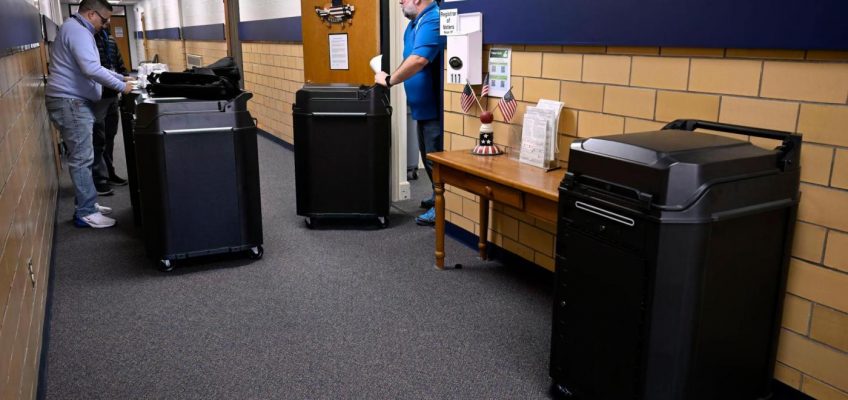By ALI SWENSON
NEW YORK (AP) — Two election watchdog organizations sued President Donald Trump’s administration on Monday over his executive order seeking to overhaul the nation’s elections through a proof-of-citizenship requirement, new mail ballot deadline restrictions and other sweeping changes.
Related Articles
Trump task force to review Harvard’s funding after Columbia bows to federal demands
US immigration officials look to expand social media data collection
White House abruptly fires career Justice Department prosecutors in latest norm-shattering move
Trump has begun another trade war. Here’s a timeline of how we got here
Trump’s reciprocal tariffs will overturn decades of trade policy
The lawsuit, filed by the Campaign Legal Center and the State Democracy Defenders Fund in the U.S. District Court for the District of Columbia, asks the court to declare the order unconstitutional and stop it from being implemented.
It names three nonprofit voter advocacy organizations as plaintiffs that it alleges are harmed by the order: the League of United Latin American Citizens, the Secure Families Initiative and the Arizona Students’ Association.
“The president’s executive order is an unlawful action that threatens to uproot our tried-and-tested election systems and silence potentially millions of Americans,” said Danielle Lang, senior director of voting rights at the D.C.-based Campaign Legal Center. “It is simply not within the president’s authority to set election rules by executive decree, especially when they would restrict access to voting in this way.”
The White House didn’t immediately respond to a request for comment.
Monday’s lawsuit marks the first major legal challenge to last week’s executive order, which election lawyers have warned may violate the U.S. Constitution and asserts power they say the president does not have over an independent agency. That agency, the U.S. Election Assistance Commission, sets voluntary voting system guidelines and maintains the federal voter registration form.
New voting tabulators are pictured at the Registrars of Voters Office, Thursday, March 27, 2025, in Vernon, Conn. (AP Photo/Jessica Hill)
It comes as Congress is considering codifying a proof-of-citizenship requirement for voter registration into law, and as Trump has promised more actions related to elections in the coming weeks.
The lawsuit draws attention to the Constitution’s “ Elections Clause,” which says states — not the president — get to decide the “times, places and manner” of how elections are run. That section of the Constitution also gives Congress the power to “make or alter” election regulations, at least for federal office, but it doesn’t mention any presidential authority over election administration.
“The Constitution is clear: States set their own rules of the road when it comes to elections, and only Congress has the power to override these laws with respect to federal elections,” said Lang, calling the executive order an “unconstitutional executive overreach.”
The lawsuit also argues the president’s order intrudes on Americans’ right to vote.
Trump, one of the top spreaders of election falsehoods, has argued this executive order will secure the vote against illegal voting by noncitizens. Multiple studies and investigations in individual states have shown that noncitizens casting ballots in federal elections, already a felony, is exceedingly rare.
Monday’s lawsuit against Trump’s elections order could be just the first of many challenges. Other voting rights advocates have said they’re considering legal action, including the American Civil Liberties Union and Democratic attorney Marc Elias. Several Democratic state attorneys general have said they are looking closely at the order and suspect it is illegal.
Meanwhile, Trump’s order has received praise from the top election officials in some Republican states who say it could inhibit instances of voter fraud and give them access to federal data to better maintain their voter rolls.
If courts determine the order can stand, the changes Trump is demanding are likely to cause some headaches for both election administrators and voters. State election officials, who already have lost some federal cybersecurity assistance, would have to spend time and money to comply with the order, including potentially buying new voting systems and educating voters of the rules.
The proof-of-citizenship requirement also could cause confusion or voter disenfranchisement because millions of eligible voting-age Americans do not have the proper documents readily available. In Kansas, which had a proof-of-citizenship requirement for three years before it was overturned, the state’s own expert estimated that almost all the roughly 30,000 people who were prevented from registering to vote during the time it was in effect were U.S. citizens who had been eligible.
Monday’s lawsuit is the latest of numerous efforts to fight the flurry of executive actions Trump has taken during the first months of his second term. Federal judges have partially or fully blocked many of them, including efforts to restrict birthright citizenship, ban transgender people from military service and curb diversity, equity and inclusion initiatives among federal contractors and grant recipients.
The Associated Press receives support from several private foundations to enhance its explanatory coverage of elections and democracy. See more about the AP’s democracy initiative here. The AP is solely responsible for all content.


Leave a Reply